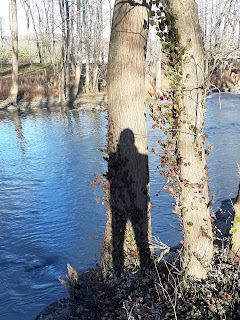Ben Camino's Ironic Advent 2020 Meditation #4:
Slant Advent
"Tell all the truth but tell it slant --
Success in Circuit lies"
Emily (Dickinson) said it, I believe it, that settles it.
Except of course Emily never settled anything, even when she preached. Ambiguity, irony, resistance in every phrase. Even -- in her -- punctuation -- faith -- hope -- and love -- desired and pushed away with -- every breath. Fragments.
God I love Emily. And not just because my daughter went to Mount Holyoke.
"Tell all the truth, but tell it slant" she said, which means, if anything, you can't tell (or know) all the truth the way some people talk or think of truth but you have to talk about it anyway(s).
There's a certain slant of light Advent afternoons and I went hunting it sometime between None and Vespers today on the path by the bed of the old canal dug by German and Irish immigrants in my neck of the woods 180 or so years ago.
On one side of the old tow path is the canal bed. On the other is the Wabash River. And not far from my house is the "forks of the Wabash" --basically a little island that splits the river in two for a bit. It's a pretty place, full of ghosts and giant Sycamore Trees.
A good place to run, to look about, to ruminate.
Many of those trees are now leaning slantwise towards the River. When you get there on a December afternoon, with the certain slant of sunlight shining on the water and washing all you see in muted silver, you want to pray for your friends, sing imprecatory psalms "in honor" of your enemies, and chant the names of everyone you've ever loved. It makes you hungry too, but that's beside the point.
Advent, Ironic Advent, Slant Advent, Emily's Advent is the pilgrim path between but always in relation to and with the different (conflicting?) aspects of the story. The promise of the baby King of peace. The coming of the King of justice. The quick reminder on December 26 that lots of babies (not to mention German and Irish immigrant canal diggers)* have to suffer and die in this dark but sometimes lit with muted silver world between then and then.
It's a lot to take in. To believe. To "celebrate." Yet Dickinson's life and writings make it clear she didn't plan to let go because belief was a problem and faith was difficult. She was particularly drawn to the story of Jacob wrestling with God as a typology of her own faith. In her famous letter to Judge Otis Phillips Lord, she wrote, "We both believe and disbelieve a hundred times an hour, which keeps believing nimble."
One of Ben Camino's Four Spiritual Laws is from another poet he loves much, perhaps inordinately, Gerard Manley Hopkins -- "The world is charged with the grandeur of God." Hopkins urges us pay closer attention to the dear "freshness deep down things." Dickinson would agree but only fifty times an hour. The other fifty she would be wondering about Deus absconditus, the God who hides himself soooo deep down that we might question a.) the official story and/or b.) the character of such a Divine Sneak. The God who lurks.
The dying sun of December, the muted silver of all that slant light, makes me look twice at . . . everything. The glory is veiled. It beckons and pushes away. Or, perhaps, urges us to pay closer attention, because Love wants to be sought and found. I thought a lot about the veiled glory, the hidden God, the muted light today as I paid attention and as I thought about Advent.
He came, they say, veiled not just in human vesture, but fully invested in the shit and blood and placenta and messiness of a human life. A poor young woman was his mother. A donkey was his chariot. Certain poor shepherds sobered up just in time to learn the hymn the angels taught them and come to the first Christmas service. It was a cattle shed after all. But . . . kings came.
Or not. Sometimes it's too much to believe. And then it isn't. You look again. You don't want to be taken in. But you might want to be . . . part of the story.
For those who don't know the poem, Emily's image of "a certain slant of life / on winter afternoons" seems primarily a negative one. It "hurts" (but "without a scar"); it "oppresses like the weight / of cathedral tunes" (is that definitely bad?). It's not clear to me, though, that Dickinson is complaining. Or, that she is only complaining. At the same time, she is registering the weight, the gravity, the cut, the numinous charge (not necessarily pleasant, however) of this slant light and whatever it represents.
As I said, my path between the old canal bed and the Wabash is a good place to run, to look about, and to ruminate. As are Emily's mind and words. As is, I hope, this Slant Advent Meditation by your not-so-humble servant, Ben Camino.
*Some estimate that one canal digger died (and many were buried on the spot) for every six feet of canal.


No comments:
Post a Comment